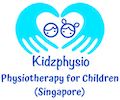Social-Emotional Development from Birth to 5
Many parents are concerned about their child's poor emotional regulation.
Watch this short video to learn the importance of having healthy social-emotional skills.
Take a quick look at the social-emotional milestones from birth to 5.
See how you can help develop your child's social-emotional skills.
Content of Video
This video covers:
- The importance of social-emotional development
- Social-emotional milestones from birth to 5
- How parents can help their child’s social-emotional development
The importance of social-emotional development:
- Social-emotional skills are important for connecting with others. Healthy social-emotional skills help kids to manage their emotions & make friends.
- Social-emotional development starts from birth, as soon as babies start interacting with their caregivers & continues throughout their lives.
Social-emotional milestones from birth to 5:
0 to 3 months:
- “social smiles” – starts to smile at their caregivers
- Starts making eye-contact with caregivers
- May calm self by self-soothing eg: sucking thumb
4 to 6 months:
- Responds to caregivers’ facial expressions
- Starts to express a desire to connect with caregivers eg: banging toy
7 to 9 months:
- Starts to recognize strangers & may show stranger anxiety eg: clings to caregivers
- Enjoys social games eg: songs with simple actions
- Enjoys looking at self in a mirror
10 to 12 months:
- Enjoys copying others in play
- Repeats sounds & actions to get attention
1 to 2 years old:
- Starts to establish independence – may throw tantrums if child doesn’t get his/her way
- Likes being the center of attention
- Likes being around other kids, but may not share toys with them
2 to 3 years old:
- Likes copying adults doing housework eg: cleaning, sweeping etc
- Starts showing attention towards friends
- May get upset with sudden changes in routine
3 to 4 years old:
- Starts to share toys with others
- Learns to take turns
- Starts to use words to communicate, instead of acting out
4 to 5 years old:
- Develops closer friendships
- Starts to be sensitive to others’ feelings
- Still fluctuates between cooperating & acting out
How parents can help their child’s social-emotional development:
- Parents can help their child’s social-emotional development by being responsive to their emotions & behaviours.
- Ask questions to help their child develop problem-solving skills.
- Use stories to talk to your child about different situations & how each person may be feeling.
- Teach your child how to take turns when playing games.
